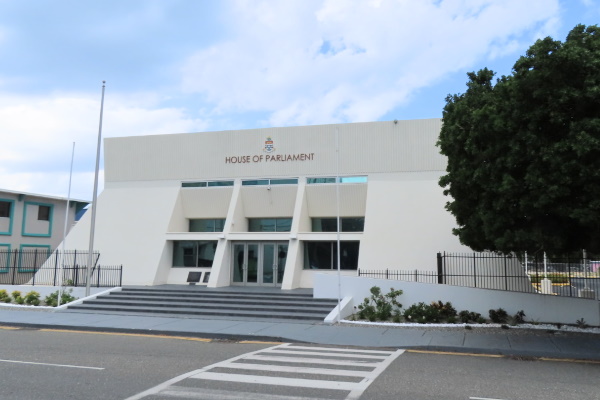Cayman Islands Laws

The Cayman Islands’ legal system is based on English common law, locally enacted law and Orders-in-Council, which is legislation that the UK extends to its territories. Laws are passed by majority vote by the members of the House of Parliament but must be assented to by the Cayman Islands Governor.
Read: How laws are passed in the Cayman Islands
See Law Reform Commission Discussion Papers
Key Laws of the Cayman Islands:
See comprehensive list of all Cayman Islands Legislation here
Cayman Islands Constitution 2009
Animals Law:
- Animals Law (2015 Revision)
- List Of Prohibited Breeds In Accordance With The Animals (Prohibited Dogs) (Amendment) Regulations 2014, Section 2.
Civil Law:
- Marriage Law (2010 Revision)
- Matrimonial Causes Law (2005 Revision)
- Probate and Administration Rules (2008 Revision)
Charities and non-profit organisations (NPOs):
- Companies (Amendment) Law, 2018
- Non-Profit Organisation Law, 2017
- Section 80, Companies Law (2018 Revision)
- Non-Profit Organisations (Registration Application) (Amendment), 2019
- Beneficial Ownership (Limited Liability Partnership) Regulations, 2019
Coastguard:
Construction:
- Fences Law (1997 Revision)
- Builders Law, 2007
- Builders (Amendment) Bill, 2015
- Builders (Amendment) Regulations, 2015
- Building Code (Amendment) Regulations, 2016
- Development and Planning Law (2017 Revision)
- Development and Planning Regulations (2017 Revision)
- Registered Land (Amendment) Bill, 2017 (Volumetric Plans and Parcels)
Consumer Protection:
Courts:
Crime:
- Alternative Sentencing Law (2008 Revision)
- Anti-Corruption Law (2019 Revision)
- Anti-Corruption (Amendment) Bill, 2018
- Anti-Corruption (Amendment) Bill, 2022
- Criminal Justice (Offenders Assisting Investigations and Prosecutions) Bill, 2022
- Criminal Procedure Code (2011 Revision)
- Criminal Procedure Code (Amendment) Bill, 2018
- Criminal Records (Spent Convictions) Bill, 2016
- Criminal Records (Spent Convictions) Law (2018 Revision)
- Evidence Law (2019 Revision
- Firearms Law (2008 Revision)
- Gambling Law (2016 Revision)
- Gambling (Amendment) Bill, 2018 (under review for further amendment)
- Gambling (Amendment) Bill, 2022
- Litter Act (1997 Revision)
- Misuse of Drugs Law (2017 Revision)
- Penal Code (2022 Revision)
- Penal Code Prohibited Publications Order (1998 Revision) (banned books)
- Penal Code (Amendment) Bill, 2018 (grooming children, etc)
- Police Law 2010
- Proceeds of Crime Law (2019 Revision)
- Traffic Act (2021 Revision)
- Youth Justice Law (2019 Revision)
Customs and Border Control:
- Customs and Border Control Act (2021 Revision)
- Customs and Border Control (Prohibited Goods) (Amendment) Order, 2024
- Customs and Border Control (Prohibited Goods) (Amendment) Order, 2023
- Customs and Border Control (Prohibited Goods) (Amendment) Order, 2021
- Advance Passenger Information (Amendment) Bill, 2018
- Customs and Border Control Bill, 2018
- Customs Tariff Law, 2015
- Customs Law (2012 Revision)
- Customs Law (2017 Revision)
- Customs Tariff Law (2017 Revision)
- Customs and Border Control Law, 2018
Data Protection:
Disaster Management:
- Disaster Preparedness and Hazard Management Law, 2016
- Disaster Preparedness and Hazard Management (Amendment) Bill, 2018
- Price Gouging Control (Emergency Circumstances) Law (2015 Revision)
District Councils:
Duty, fees and taxes:
Government / Public Service:
- Public Service Management Law (2013 Revision)
- Public Service Management Law (2017 Revision)
- Public Management and Finance Law (2010 Revision)
- Standards in Public Life Law, 2014 (not implemented)
- Standards in Public Life (Amendment) Bill, 2016
- Public Authorities Law, 2017
Education:
Elections Law:
Employment:
- Gender Equality Law, 2011
- Labour Act (2021 Revision)
- Labour Law (2011 Revision)
- Labour Tribunals Regulations (2012 Revision)
- The Labour (National Minimum Basic Wage) Order, 2016
- Workmen’s Compensation Law (1996 Revision)
- Workmen’s Compensation Regulations (1998 Revision)
Environmental Health:
- Public Health Law (2002 Revision)
- Public Health (Garbage and Refuse Disposal) Regulations (2011 Revision)
- Public Health (Infectious Waste) Regulations (2002 Revision)
Environment:
Financial Services:
- See all Laws and Regulations for Financial Services in the Cayman Islands, CIMA
- Director Registration and Licensing Law 2014 – CIMA fact sheet
Freedom of information:
Health:
- Public Health (Control and Suppression of COVID-19) Regulations, 2020
- Health Insurance Laws & Regulations, Dept. Health Regulatory Services
- Health Practice Laws & Regulations, Dept. Health Regulatory Services
- Insurance Law, 2010
- Health Insurance Commission (2011 Revision), DHRS
- Human Tissue Transplant Law, 2013
- Health Insurance Law (2016 Revision)
- Health Insurance Regulations (2017 Revision)
- Health Insurance Law (2018 Revision)
- Health Care Decisions Bill, 2019 (draft)
ICT:
Immigration (see WORC below):
- Immigration Laws and Regulations, Full listing of immigration laws on CIG Immigration Dept website.
- Immigration (Transition) Act (2022 Revision)
- Immigration Law (2013 Revision)
- Immigration (Amendment)(No. 2) Law, 2013
- Immigration (Amendment) Regulations, 2013
- Immigration Law (2014 Revision)
- Immigration (Landing of Persons) Directions, 2014
- Immigration Regulations (2015 Revision)
- Immigration Law (2015 Revision)
- Immigration (Amendment) Regulations, 2017
- The Immigration (Amendment) Bill 2018
- Immigration Regulations (2018 Revision)
Landlord and Tenant:
Litigation:
National ID:
Parliament (previously the Legislative Assembly):
- Parliament (Management) (Amendment) Bill, 2022
- Legislative Assembly Standing Orders (2006) Revision
- Standing Orders of the House of Commons, United Kingdom
Pensions:
- Public Service Pensions Law (2011 Revision)
- Public Service Pensions Regulations (2011 Revision)
- National Pensions (Pension Fund Investments) Regulations (1998 Revision)
- National Pensions (General) Regulations (2011 Revision)
- National Pensions Law (2012 Revision)
- National Pensions (Amendment) Law, 2016 (Commencement) Order, 2016
- Normal Age of Pension Entitlement Option Order, 2016
- National Pensions (Amendment) Law, 2016
- National Pension (Amendment) Bill, 2020
Planning:
Prison/Prisoners:
- Conditional Release Law, 2014
- The Conditional Release of Prisoners Regulations, 2016
- Conditional Release Law Fact Sheet
- Colonial Prisoners Removal Act 1884 (UK law)
Social Welfare:
Trade & Business:
- Trade and Business Licensing Law, 2014
- Trade and Business Licensing (Amendment) Law, 2017
- Local Companies (Control) Law (2019 Revision)
Traffic:
- Traffic Act (2021 Revision)
- Traffic Law, 2011
- Traffic Regulations, 2012
- Traffic Control Regulations, 2012
- Traffic (Seat Belts) Regulations, 2012
- Traffic (Amendment) Bill, 2018
- Traffic (Public Passenger Vehicles) Regulations (2014 Revision)
- Vehicle Insurance (Third Party Risks) Law (2012 Revision)
Workforce Opportunities and Residency Cayman (WORC):
Miscellaneous:
- Adoption of Children Law, 2013
- Children Law (2012 Revision)
- Dangerous Substances Law (2017 Revision)
- Defamation Law (1995 Revision)
- Freedom of Information (Amendment) Bill, 2018
- Gambling (Amendment) Law, 2015
- Information and Communications Technology Authority Law (2011 Revision)
- Information and Communications Technology Law (2017 Revision)
- Judicature Law (2017 Revision)
- Limitation Law (1996 Revision)
- Liquor Licensing Law (2000 Revision)
- Older Persons Bill, 2017
- Port Regulations (2011 Revision)
- Prescription Law (2018 Revision)
- Public Lands Act (2020 Revision)
- Music and Dancing (Control) (Amendment) Bill, 2022
- Tobacco Law, 2008
- Towns and Communities Law (1995 Revision)
- Water Sector Regulation Law, 2017
- Whistleblower Protection (Amendment) Bill, 2018 (draft)
More information:
- Cayman Government Gazette Office
- Laws of the Cayman Islands, Cayman Islands Judicial and Legal Information
- Consolidated Index of Laws and Subsidiary Legislation, 31 July 2014


